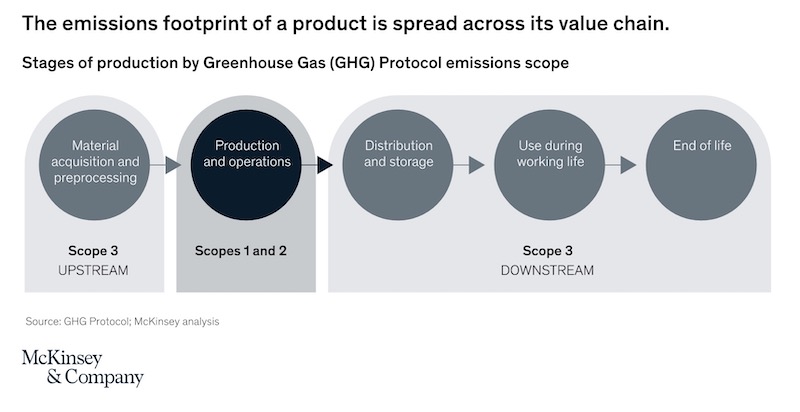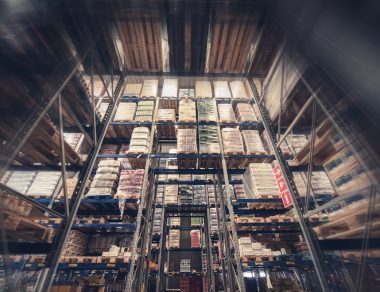
Good business requires a green supply chain. From a nice-to-have to a must-have, sustainable business practice and a sustainable supply chain is a necessary component of the modern business. Embracing supply chain sustainability can lead to better business outcomes and positive environmental and social impacts. As you consider the potential benefits of a more sustainable supply chain, it's essential to understand the driving forces behind this shift and how your OEM can benefit from incorporating suitable practices.
By incorporating sustainability into all stages of your supply chain, a manufacturer demonstrates a commitment to ethical and environmentally-friendly practices, which will have a major impact on brand reputation and appeal to clients who are increasingly conscious of environmental impact, regulatory compliance and positive social outcomes.
In practical terms, a sustainable supply chain can also help reduce operational costs and risks, such as by improving resource management and encouraging greater efficiency in your supplier relationships.
In order to achieve supply chain sustainability, it's crucial to identify areas for improvement within your operations, develop strong partnerships with suppliers (easy to do with a master supplier such as Acorn), and continually assess and refine your processes. By integrating sustainability into the heart of your organisational strategy, you can create a positive impact, strengthen stakeholder engagement, and foster long-term business success.
Understanding Supply Chain Sustainability
What Is Supply Chain Sustainability?
Supply chain sustainability refers to the management of environmental, social, and economic factors within your company's supply chain. An essential aspect of this is recognising the link between a manufacturer and the broader ecosystem, and incorporating responsible practices in all aspects of supply chain operations. In fact, many companies have started focusing on supply chain sustainability due to increasing regulatory and compliance reasons.
Environmental Impact
One of the primary reasons why more companies have embraced supply chain sustainability is to counter the environmental impact of their operations. At Acorn we are keenly aware of this and have enacted practical solutions and operational changes to be an environmentally-responsible partner (some of which we'll delve into in a future article)
By focusing on your organisation's environmental footprint, you can tackle issues such as carbon emissions, waste production, and energy consumption. Even small changes within your upstream and downstream supply chain can make a significant difference beyond the short term to reducing environmental harm.
Some of the key benefits of managing your supply chain’s environmental impact include:
- Reduced costs and improved efficiency.
- Enhanced brand reputation in the eyes of consumers.
- Greater compliance with increasingly stringent environmental regulations.
- A position as a sustainability leader in your industry (good for attracting clients, talent, and investors).
Circular Economy
Incorporating a circular economy approach in your supply chain is another crucial aspect of sustainability. The circular economy aims to minimise waste and make the most efficient use of resources by following the principles of 'reduce, reuse, and recycle.' Embracing this model can lead to a more sustainable and resilient supply chain, capable of adapting to changing market dynamics and resource constraints.
To achieve a circular economy approach, you can consider the following steps:
- Evaluate your supply chain to identify areas where resources can be optimised or waste can be reduced.
- Collaborate with suppliers and partners to promote and implement sustainable practices.
- Introduce circular economy practices, such as reverse logistics for product returns and recycling materials.
- Innovate and transform existing business models to extend product lifecycles or create new revenue streams from waste or under-utilised resources.
We work with clients on the simple things first: collaborating on reducing packaging, and substituting with more eco-friendly material. Looking at component use, consolidation and standardisation are also easy wins. But more strategic systemic work can involve working on this as part of DfA (Design for Assembly) manufacturer/supply chain partner collaboration to optimise assembly and production.
By focusing on the environmental impact of your operations and transitioning towards a circular economy model, you can build a stronger, more sustainable foundation for your company's future.

4 Areas to Implement Sustainable Practices
— Sustainable Procurement. — Green Supply Chain Management. — Supplier collaboration. — Responsible sourcing.
Sustainable Procurement
In sustainable procurement, you should focus on purchasing goods and services that minimise negative environmental and social impacts. This can include considering the lifecycle of products, energy efficiency, waste reduction, and fair labour practices. By implementing sustainable procurement practices, you can reduce your company's carbon footprint and promote ethical business practices.
Green Supply Chain Management
Green supply chain management encompasses all efforts to create a more environmentally-friendly and resource-efficient supply chain. This may involve:
- Reducing waste and emissions
- Promoting recycling and upcycling
- Minimising packaging
- Optimising transportation and logistics
To achieve these goals, you should consider incorporating sustainability strategies into your supply chain operations and engage with suppliers that share the same vision.
Supplier Collaboration
Supplier collaboration is crucial to achieving supply chain sustainability, as it allows businesses to work together to create more efficient, eco-friendly processes. According to netsuite, "by establishing relationships with Tier 1 suppliers and contract manufacturers, companies can develop a deeper understanding of their practices and work together to improve sustainability across the supply network." You can leverage Acorn's 3PL and procurement services to do just this.
Other ways to encourage collaboration and transparency among suppliers can involve setting up regular communication channels, sharing best practices, and rewarding suppliers who demonstrate substantial progress in sustainability.
Responsible Sourcing
Responsible sourcing ensures that the products and services you procure are ethically and sustainably produced. This involves not only assessing environmental factors but also addressing social and economic concerns, such as fair labour practices and human rights.
To implement responsible sourcing:
-
- Develop a code of conduct for suppliers that sets clear expectations for ethical behaviour.
- Conduct regular audits and assessments to ensure compliance.
- Encourage transparency and traceability in your supply chain.
- Seek out certifications and industry standards to validate your responsible sourcing efforts.
- Consider a trusted supply chain partner and master supplier to leverage an extensive network to help fast track implement.
By adopting sustainable practices in these areas – sustainable procurement, green supply chain management, supplier collaboration, and responsible sourcing – you can ensure your OEM business contributes to a more sustainable future.
Sustainability in Manufacturing
For OEM manufacturers, adopting sustainability strategies creates value for your stakeholders but also puts your company on the front foot for social, competitive and compliance advantages.
One pivotal aspect to consider is the design for sustainability approach. During the product design phase, take into account carbon footprint production and usage. By introducing low- and zero-carbon designs, companies can effectively reduce your company's environmental impact and promote circular economy principles. Integrating new capabilities and tools into product development functions help you achieve these objectives.
In addition to design, sustainable supply chain management (SSCM) plays a vital role in achieving sustainability in manufacturing. A sustainable supply chain goes beyond focusing on top-tier suppliers; it's crucial to assess the environmental and social risks associated with suppliers at all levels. Paying attention to these factors can improve materials sourcing, protect your brand reputation and contribute to better overall business performance.
Utilise sustainability audits
Supply chain sustainability audits help identify and improve green supply chain and ESG factors for an organisation. They are essential in identifying improvements and taking corrective action where necessary and should be used as part of a broader strategy in improving manufacturing sustainability. Major areas in your manufacturing process to make it more sustainable include:
- Optimising resources and energy use:
Implement energy-efficient equipment, monitor energy consumption, and adopt waste-reduction strategies. - Minimising waste:
Employ lean strategies, use recycled materials, and establish recycling programmes for waste generated during production. - Embracing green manufacturing technologies:
Invest in environmentally-friendly production technologies that reduce emissions, enhance safety and improve productivity. - Up-skilling workforce capabilities:
Train your team members in sustainable practices, engage them in continuous improvement processes and develop an environmentally conscious work culture.
During challenging times, the importance of sustainability in manufacturing becomes even more evident as it helps businesses achieve resilience and profitability in a reduced-activity environment.
Consider sustainability as part of your manufacturing process in these key areas: design and engineering, sourcing and componentry, processes and production, delivery and transportation, aftermarket repairs and maintenance.
Through implementing sustainable manufacturing practices and focusing on both design and supply chain management, you'll be equipping your company with the capability to endure market changes and shifting customer expectations. Ensuring you work with the right supply chain partner that shares and operates with similar values will accelerate your strategic and operational implementation of sustainable supply chain management.
FAQ
What is supply chain sustainability?
In essence, supply chain sustainability is the integration of sustainable practices and principles into the entire strategic scope of supply chain strategy, to the ultimate benefit of both the business and its stakeholders. Supply chain sustainability involves proactive management of environmental, social, and economic aspects within a company's supply chain operations. It encompasses a holistic approach that considers the entire product life cycle, from raw material sourcing to production, distribution, consumption, and disposal. Supply chain sustainability aims to minimise negative environmental impacts, promote fair labour practices, and ensure responsible sourcing while maintaining economic viability.
What is sustainable supply chain management?
Sustainable supply chain management (SSCM) is the implementation by companies of strategies, processes and procedures to mitigate the negative effects of their operations on the environment and society. By balancing economic development, environmental stewardship, and social accountability, it aims to achieve these goals. Since businesses are under ever more pressure to treat their stakeholders with respect, this idea is growing in importance for good corporate governance. With a greater emphasis on sustainability than ever before, businesses are now held responsible for their actions by customers, clients and society at large.
Sources: — Deloitte: Sustainability in the manufacturing sector — Gartner: Supply Chain Sustainability: Why It Is Important and Best Practices — McKinsey: Building sustainability into operations — Carbon Trust: Carbon footprinting for businesses — BSR (Business for Social Responsibility): Creating more resilient, just, and transparent value chains.










